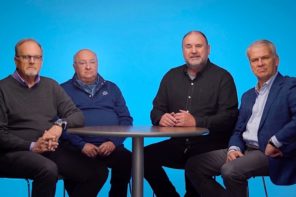On Friday, July 27, Richard Land, the embattled president of the Ethics & Religious Liberty Commission of the Southern Baptist Convention, addressed over 6,000 religious conservatives at Glenn Beck’s “Under God, Indivisible” rally at High Point Church in Arlington, Texas. The 2012 presidential election is, Land told the crowd, “the most important election since 1860.”
Just a few days after preaching this anti-Obama sermon, Land announced his plans to step down as president of the Southern Baptist ethics agency. Land’s retirement will not be effective until October 23, 2013, exactly twenty-five years after assuming the position in 1988. In those years, Land has risen in the ranks of the religious right—and achieved media prominence to the degree that in 2005, Time magazine dubbed Land “God’s Lobbyist” and listed him as one of the nation’s 25 most influential evangelicals in America. Two years later, Religion News Service featured Land as one of the “Top 10 GOP King Makers.”
A Rise that Paralleled the Rise of the SBC in Politics
Richard Dale Land was born on November 6, 1946 in Houston, Texas. A sixth generation Texan and “cradle roll” Southern Baptist, Land walked the aisle, confessed his faith and was baptized at the age of six. He left Houston in 1965 to attend Princeton University but returned to the South upon graduation to attend New Orleans Baptist Theological Seminary. There, Land befriended future fundamentalist leader Paige Patterson at the suggestion of his mentor and fellow Princeton alum, Houston judge Paul Pressler.
After finishing his seminary training, Land began a doctoral program in theology and history at Oxford University. With his coursework complete, Land returned in 1975 to the Lone Star state to join the faculty of the Criswell Bible Institute in Dallas, turning down a more lucrative offer to from Jerry Falwell to teach at Liberty College. In 1987, he took a leave of absence from his Criswell post to work as an aide to Governor Bill Clements, the first Republican governor of Texas since Reconstruction.
Meanwhile, Land’s friends Paige Patterson and Paul Pressler were executing a plan to take over the Southern Baptist Convention; their strategy focused electing “conservative” presidents committed to the doctrine of biblical inerrancy and the social orthodoxy of the religious right. With a decade-long series of presidential victories, Land’s friends and their fundamentalist coalition had gained complete control by 1990 of the nation’s largest Protestant denomination.*
With the takeover near completion, Pressler helped install Land as president of the SBC’s Christian Life Commission in 1988. The selection of Land to head the denomination’s ethics agency signaled a distinctly different political direction for Southern Baptists on a host of social issues. Under the 27-year tenure of Land’s predecessor Foy Valentine, the CLC had a moderate-to-progressive social outlook supporting birth control, abortion rights, sex education, racial justice, equal rights for women, and strict environmental regulations.
These “liberal” positions made the CLC a symbol to fundamentalists—especially those active in the religious right—of all that was wrong with the Southern Baptist Convention.
“We Want a Wedding”
Land immediately steered the CLC straight into the arms of the Republican Party. Prior to being tapped to head the CLC, Land had pledged his support to presidential candidate George H. W. Bush after the elder Bush sent his son, George W. Bush, to meet with him. Four years later, Land helped mobilize Southern Baptists in support of President Bush’s reelection bid against Southern Baptists Bill Clinton and Al Gore.
The CLC got a makeover too as Land hired the communications director of the US House’s Republican Study Committee to be the agency’s first full-time staff member on Capitol Hill. The speaker lineup at the CLC’s annual conference changed as well: Republican speakers outnumbered Democrats 6-1 from 1988 until 1999. The speaker selections (a literal Who’s Who of the religious right) said much about Land and demonstrated his growing influence among the conservative Christian elite.
Not satisfied with the relationship between between the Republican Party and the religious right, Land said in March 1998: “The go-along, get-along strategy is dead. No more engagement. We want a wedding ring, we want a ceremony, we want a consummation of marriage.”
His demands were met with the election of friend and Texas governor George W. Bush in 2000: Land was granted great access to the White House and in return the Bush administration received Land’s unwavering support. In 2002, Land authored a letter to President Bush—signed by several other prominent religious right leaders—offering a moral justification for a preemptive US military strike against Iraq. Land even went on a media tour to defend Bush’s war policy.
In 2004, Land set out to secure a second term for President Bush and launched an “I Vote Values” campaign that urged Christians to vote “biblically.” Andrew Hogue of Baylor University has written that during the 2004 reelection campaign Land became the “unofficial spokesperson for the president on values issues, telling stories about personal encounters with Bush and his deep faith.” Noticing Land’s growing influence in American politics, Ted Olsen of Christianity Today asked in 2002 whether Richard Land was the new leader of the religious right.
Without a Bush on the presidential ballot, Land lost his way in 2008. Always claiming to be closely connected to grassroots Southern Baptists, Land refused to get behind fellow Southern Baptist Mike Huckabee despite the former Arkansas governor’s immense popularity among pew-sitters. Instead, Land and his old mentor Paul Pressler flocked to former Tennessee Senator Fred Thompson, an infrequent churchgoer with a spotty “pro-life” record. Before Thompson even made an official announcement, Land was appearing on cable news networks trying to sell the Law & Order star to the masses calling him a “Southern-fried Reagan.” Once Senator John McCain secured the GOP nomination, Land fell in line, reasoning that a “third-rate fireman” (McCain) was preferable to a “first-class arsonist” (Obama).
A Split Personality on Religious Freedom
No issue has been more central to the Baptist tradition in its 400-year history than religious freedom. Land has been consistently criticized over the years by Baptists and non-Baptists alike for his positions on church-state issues. More specifically, Land has been accused of abandoning the Baptist commitment to church-state separation. At least one sympathetic scholar has concluded that Land’s church-state philosophy is “rather incoherent.” His demands for “maximum acceptance, maximum acknowledgment, maximum accommodation” of the Christian faith belie his claim of support for an institutional separation of church and state.
Land’s religious liberty views and advocacy with regard to Muslims can be fairly characterized as slightly schizophrenic. In 2010, Land was quick to voice his opposition to plans to build an Islamic center six blocks from Ground Zero in New York City. Unlike many opponents, Land actually offered a legal argument against the proposal citing the Supreme Court’s City of Boerne v. Flores (1997) ruling. Yet, back in 1998, Land called the Boerne ruling “one of the worst decisions rendered by the Supreme Court in its long history.”
When not trying to restrict the rights of Muslims, Land was defending those same rights. Later in 2010, Land announced his support for a group of Muslims attempting to build an Islamic center in Murfreesboro, Tennessee. He also joined a interfaith coalition to protect the religious freedom of Muslims but resigned from the coalition a few short months later. Explaining his departure, Land stated that his fellow Southern Baptists felt that defending the religious freedom of Muslims in the courtroom was “a bridge too far.”
A Tarnished Record on Race
Paige Patterson, president of Southwestern Baptist Theological Seminary, recently reflected on Land’s legacy, arguing that his longtime friend should be remembered for his work on behalf of racial reconciliation: “I believe [Land’s] legacy will be to recognize that he led a 14 to 16 million member denomination to completely reverse its position on race.”
Most scholars—including Southern Baptists—would dispute this claim, attributing the reversal to moderate leaders and progressive dissenters such as Land’s predecessor Foy Valentine.
Land’s legacy on race issues is certainly complex. Early in his tenure, Land hosted a race summit to hear the concerns of African-American Southern Baptists. Six years later, he spearheaded an effort to publicly apologize for the denomination’s support of slavery and racist past. Not all applauded this racial reconciliation resolution. African-American journalist Bill Maxwell wondered:
If Southern Baptists are serious about atoning for their historical sins, how can they also join Republicans in destroying affirmative action—the one federal program that modestly attempts to redress some of the wrongs of discrimination?
Land recently did serious damage to his reputation with a racially-charged rant on his radio show that received much national attention. Commenting on the shooting death of Trayvon Martin, Land accused civil rights leaders of being “race hustlers” and made disparaging remarks about President Obama. He also appeared to justify racial profiling, claiming that an African-American man is “statistically more likely to do you harm than a white man.”
Listening to the controversial radio program, this author discovered that Land had actually plagiarized his offensive rant, pulling bits from a Washington Post editorial. Prominent African-American pastor Dwight McKissic called Land’s rant the “most damaging, alienating, and offensive words about race” by a denominational leader in his 28 years as a Southern Baptist. A couple days after the plagiarism was revealed, Land issued an apology for being “sloppy” and on May 9 issued a five-part apology for his “injudicious comments.” On June 1, ERLC trustees announced their decision to terminate Land’s ten-year-old radio program and reprimand him for “hurtful, irresponsible, and racially-charged words.”
Despite the wishful thinking of devoted friend Paige Patterson, Land will not be remembered as a great racial reconciler; his record on race issues will be forever sullied. If Southern Baptists are honest with themselves they will recognize that racial reconciliation is not his legacy and never has been. In his 2005 study of Land, Andrew Hogue politely pointed out that not one of Land’s twenty employees was African-American—as late as 2009, the highest ranking African-American at the SBC headquarters in Nashville was the head janitor. While passing a racial reconciliation resolution was clearly a top priority for Land, there is little proof that actual racial justice was anywhere near the top of his agenda.
Without question, Land will be remembered for his important roles in America’s culture wars, especially with regard to abortion and gay rights: he helped give the SBC a public witness that stood in consistent opposition to gay rights, abortion rights, and even many forms of birth control. A once moderately pro-choice denomination was transformed into a “pro-life” denomination largely under Land’s leadership. He also narrowly defined “pro-life” for evangelicals to mean strictly “anti-abortion,” eschewing the more expansive understanding of that concept offered by the Catholic Church.
On the religious freedom front, Land will be remembered not for boldly following in the footsteps of his Baptist forebear Thomas Helwys and defending the freedoms of minorities such as Muslims. Instead, he will be remembered for accommodating the demands of those in his denomination devoted to cultivating “shari’ah panic.” Many who bear the name Baptist will continue to lament Land’s role in moving the SBC away from the legacy of John Leland and George W. Truett and toward the likes of revisionists such as David Barton.
Land’s most significant contribution, however, has been to lead the nation’s largest Protestant denomination to become an influential and committed constituency of both the religious right and the Republican Party.
So, what’s next for Richard Land? Time will tell. But don’t expect him to disappear from the culture war battlefield.
______________
* Biographical information in this article can be found in the writings of Baylor University professors Barry Hankins and Andrew Hogue. Both scholars have interviewed Land at length. See Barry Hankins, Uneasy in Babylon: Southern Baptist conservatives and American culture (Tuscaloosa, AL: University of Alabama Press, 2002), and Andrew Hogue, “With the Salt of the Law and the Light of the Gospel: The Ethics and Religious Liberty Commission of the Southern Baptist Convention under Richard Land,” (master’s thesis, Baylor University, 2005).




